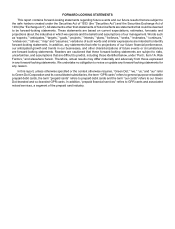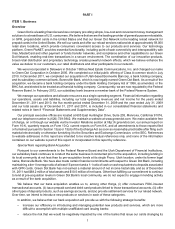Green Dot 2011 Annual Report Download - page 20
Download and view the complete annual report
Please find page 20 of the 2011 Green Dot annual report below. You can navigate through the pages in the report by either clicking on the pages listed below, or by using the keyword search tool below to find specific information within the annual report.10
laws, we must provide notice to consumers of our policies and practices for sharing nonpublic information with third
parties, provide advance notice of any changes to our policies and, with limited exceptions, give consumers the right
to prevent use of their nonpublic personal information and disclosure of it to unaffiliated third parties. Certain state
laws may, in some circumstances, require us to notify affected individuals of security breaches of computer databases
that contain their personal information. These laws may also require us to notify state law enforcement, regulators or
consumer reporting agencies in the event of a data breach, as well as businesses and governmental agencies that
own data. In order to comply with the privacy and information safeguard laws, we have confidentiality/information
security standards and procedures in place for our business activities and with network acceptance members and our
third-party vendors and service providers. Privacy and information security laws evolve regularly, requiring us to adjust
our compliance program on an ongoing basis and presenting compliance challenges.
Banking Regulations
We became a bank holding company in December 2011, as a result of our acquisition of Bonneville Bancorp, the
holding company of Bonneville Bank, a state-chartered Utah bank, which was renamed Green Dot Bank after the
acquisition. We and our subsidiary bank are extensively regulated under federal and state laws, which, in general,
results in increased compliance costs and other expenses, as we and our subsidiary bank are required to undergo
regular on-site examinations and to comply with additional reporting requirements. As a bank holding company, we
are subject to the supervision of, and inspection by, the Federal Reserve Board and are subject to certain regulations
which, among other things, restrict our business and the activities in which we may engage. Our existing business
activities and currently proposed business activities are not materially restricted by these regulations.
Activities. Federal laws restrict the types of activities in which bank holding companies may engage, and subject
them to a range of supervisory requirements, including regulatory enforcement actions for violations of laws and
policies. Bank holding companies may engage in the business of banking and managing and controlling banks, as
well as closely related activities. In addition, financial holding companies may engage in a wider set of activities,
including with respect to securities activities and investments in companies engaged in nonbanking activities. The
business activities that we currently conduct are permissible activities for bank holding companies under U.S. law, and
we do not expect the limitations described above will adversely affect our current operations or materially restrict us
from engaging in activities that are currently contemplated by our business strategies. It is possible, however, that
these restrictions could limit our ability to enter other businesses in which we may wish to engage at some time in the
future. It is also possible that in the future these laws may be amended in ways, or new laws or regulations may be
adopted, that adversely affect our ability to engage in our current or additional businesses.
Even if our activities are permissible for a bank holding company, as discussed under “— Capital Adequacy” below,
the Federal Reserve Board has the authority to order a bank holding company or its subsidiaries to terminate any
activity or to require divestiture of ownership or control of a subsidiary in the event that it has reasonable cause to
believe that the activity or continued ownership or control poses a serious risk to the financial safety, soundness or
stability of the bank holding company or any of its bank subsidiaries.
Dividend Restrictions. Bank holding companies are subject to various restrictions that may affect their ability to
pay dividends. Federal and state banking regulations applicable to bank holding companies and banks generally
require that dividends be paid from earnings and, as described under “— Capital Adequacy” below, require minimum
levels of capital, which limits the funds available for payment of dividends. Other restrictions include the Federal Reserve
Board’s general policy that bank holding companies should pay cash dividends on common stock only out of net
income available to stockholders for the preceding year or four quarters and only if the prospective rate of earnings
retention is consistent with the organization’s expected future needs and financial condition, including the needs of
each of its bank subsidiaries. In the current financial and economic environment, the Federal Reserve Board has
indicated that bank holding companies should carefully review their dividend policies and has discouraged dividend
pay-out ratios that are at the 100% level unless both their asset quality and capital are very strong. A bank holding
company also should not maintain a dividend level that places undue pressure on the capital of its bank subsidiaries,
or that may undermine the bank holding company’s ability to serve as a source of strength for its bank subsidiaries.
See “— Source of Strength” below.
As part of our financial commitments to the Federal Reserve Board and Utah Department of Financial Institutions,
our subsidiary bank, Green Dot Bank, is restricted from paying dividends for 3 years from the date of acquisition.
Capital Adequacy. Bank holding companies and banks are subject to various requirements relating to capital
adequacy, including limitations on leverage. As a bank holding company that is a financial holding company, we are
required to be “well-capitalized,” meaning we must maintain a ratio of Tier 1 capital to risk-weighted assets of at least
6% and a ratio of total capital to risk-weighted assets of at least 10%. In addition, we are also subject to the generally
applicable bank holding company minimum Tier 1 leverage ratio of 4%, which is the ratio of Tier 1 capital to average
























